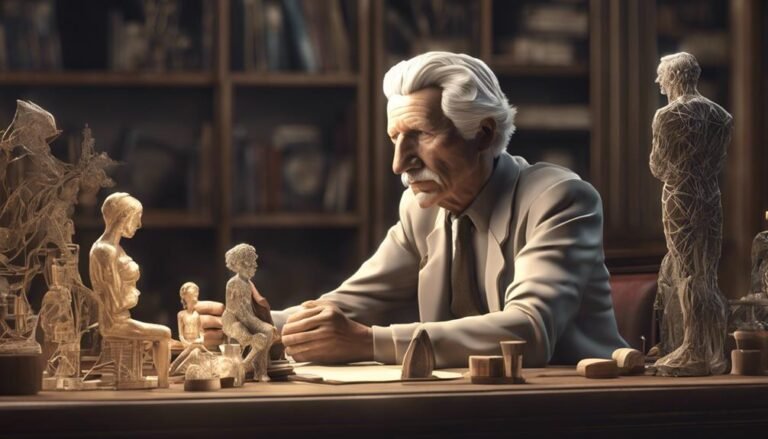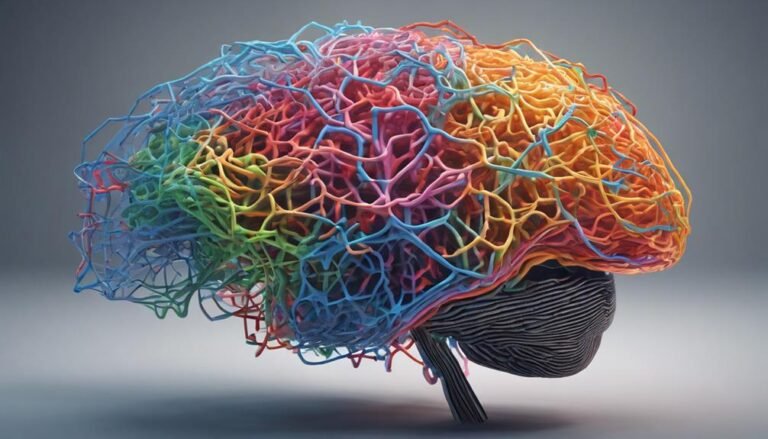Introduction to Psychodynamic Theories
As you begin exploring the domain of psychodynamic theories, you'll find a fascinating journey into the complexities of the human psyche. The foundational principles laid out by Freud and other pioneers offer a unique perspective on how our past experiences shape our present behaviors and personalities. By delving into the depths of the unconscious mind, psychodynamic theories reveal the underlying motivations that drive human actions. This intriguing approach not only reveals hidden aspects of our psyche but also provides valuable insights into the intricate dynamics of human behavior.
Key Takeaways
- Psychodynamic theories explore unconscious influences on behavior.
- Emphasis on early childhood experiences shaping personality.
- Freud's psychosexual stages theory revolutionized psychology.
- Defense mechanisms protect from distressing thoughts.
- Understanding psychodynamics aids in deeper human behavior comprehension.
Origins of Psychodynamic Theories
The origins of psychodynamic theories can be traced back to the late 19th and early 20th centuries when pioneering psychologists like Sigmund Freud and Carl Jung started to explore the complexities of the human mind and behavior. This historical background is vital in understanding the development of psychodynamic theories, as it was during this period that the foundational principles of this approach began to take shape.
One of the foundational principles of psychodynamic theories is the belief in the unconscious mind and its influence on behavior. Freud, in particular, emphasized the role of unconscious thoughts, desires, and memories in shaping an individual's actions. This concept revolutionized the field of psychology, leading to a deeper understanding of human motivations and behaviors.
Additionally, psychodynamic theories highlight the importance of early childhood experiences in shaping personality and behavior. According to Freud, events and experiences in early childhood can have a lasting impact on an individual's development, leading to the formation of defense mechanisms and unconscious patterns of behavior.
Understanding these foundational principles is essential in grasping the core concepts of psychodynamic theories.
Freud's Contribution to Psychodynamics
Freud's profound impact on the field of psychodynamics is evident in his groundbreaking exploration of the unconscious mind and its influence on human behavior. Freud's legacy in psychodynamics is monumental, with his development of the psychosexual stages theory being one of his most influential contributions.
According to Freud, individuals pass through distinct psychosexual stages during their development: oral, anal, phallic, latent, and genital. Each stage is characterized by a focus on different erogenous zones and presents unique challenges that can influence personality development and behavior later in life.
Freud's emphasis on the unconscious mind and the role of early childhood experiences in shaping personality revolutionized the field of psychology. His work paved the way for a deeper understanding of human behavior and the complexities of the mind.
Unconscious Mind and Behavior
Exploring the depths of the human psyche reveals the profound impact of unconscious processes on behavior and decision-making. The unconscious mind, as proposed by psychodynamic theories, holds repressed memories, desires, and unresolved conflicts that shape our thoughts and actions. Dream analysis, a tool used to access the unconscious, exposes hidden aspects of the self and provides insights into one's subconscious influences.
Repressed memories, deeply buried in the unconscious, can resurface unexpectedly, influencing behavior without conscious awareness. These memories, often tied to past traumas or significant events, can impact personality development and emotional responses. Understanding and addressing these repressed memories through therapeutic techniques can lead to personal growth and healing.
Moreover, subconscious influences play a significant role in shaping our personalities. Early childhood experiences, interactions with caregivers, and societal norms all contribute to the formation of our unconscious beliefs and behaviors. By delving into the unconscious mind and unraveling its complexities, individuals can gain a deeper understanding of themselves and the driving forces behind their actions.
Defense Mechanisms Explained
When exploring defense mechanisms in psychology, it's essential to understand the different types individuals may employ. These mechanisms serve a vital role in protecting one's psyche from anxiety and internal conflicts.
Types of Defense Mechanisms
Understanding defense mechanisms is essential in grasping the complexities of psychodynamic theories. They serve as unconscious strategies individuals employ to protect themselves from distressing thoughts or feelings. These coping mechanisms are deeply rooted in psychological processes, influencing emotional responses and subconscious behaviors.
There are several types of defense mechanisms that individuals may utilize. For example, repression involves pushing painful or threatening thoughts into the unconscious mind. Projection involves attributing one's unacceptable feelings or traits to others. Another common defense mechanism is denial, where individuals refuse to accept reality as a way to avoid anxiety or discomfort. Rationalization occurs when individuals create logical explanations to justify their behavior, shielding themselves from guilt or shame.
Understanding these various defense mechanisms provides insight into how individuals navigate challenging emotions and maintain psychological equilibrium in the face of internal conflicts.
Role in Psychology
In addition, defense mechanisms play an essential role in psychology by providing individuals with unconscious strategies to manage distressing thoughts and emotions. These mechanisms have historical relevance, dating back to Sigmund Freud's psychoanalytic theory, which highlighted their significance in understanding human behavior.
Today, current research continues to explore the therapeutic benefits of defense mechanisms in various therapeutic approaches. Understanding how these mechanisms operate allows therapists to help individuals uncover and address underlying issues effectively.
Research has shown that the recognition and understanding of defense mechanisms can enhance therapeutic effectiveness. By identifying and working through these mechanisms, individuals can gain insight into their unconscious processes and develop healthier coping strategies.
Additionally, therapists can use this knowledge to tailor interventions that specifically target maladaptive defense mechanisms, leading to more successful treatment outcomes.
Examples and Impact
A fundamental aspect of psychodynamic theories lies in the recognition and examination of various defense mechanisms and their profound impact on an individual's psychological functioning. These defense mechanisms, such as repression, projection, and denial, serve as important tools for the mind to cope with internal conflicts and protect itself from anxiety.
In real-life examples, individuals may use projection to attribute their own unacceptable thoughts onto others, thereby avoiding facing their true feelings. This mechanism can have a significant clinical impact, as it may hinder authentic self-reflection and interpersonal relationships.
Understanding these defense mechanisms not only provides insight into one's behavior but also offers practical applications in therapy. By recognizing and addressing these mechanisms, therapists can help individuals explore their underlying emotions and work towards healthier coping strategies. This awareness can lead to therapeutic benefits by promoting self-awareness, emotional growth, and improved mental well-being.
Psychoanalytic Therapy Techniques
One essential aspect of psychoanalytic therapy involves delving deep into the patient's unconscious mind to uncover hidden motivations and unresolved conflicts. Through therapeutic strategies like free association, dream analysis, and transference interpretation, psychoanalytic therapists aim to help individuals gain insight into their unconscious processes.
Clinical applications of these techniques involve creating a safe space for patients to explore their thoughts and feelings without judgment, allowing for a deeper understanding of their inner conflicts.
Patient progress in psychoanalytic therapy often hinges on the development of a strong therapeutic alliance between the therapist and the individual seeking treatment. This alliance serves as the foundation for the exploration of unconscious material and the processing of emotions that arise during sessions.
Key Concepts in Psychodynamics
Exploring the underlying dynamics of human behavior and the unconscious mind, key concepts in psychodynamics offer a profound understanding of the complexities that shape individual thoughts and actions. Childhood experiences play a pivotal role in shaping one's personality and behavior patterns. Emotional conflicts stemming from early interactions with caregivers can manifest in adulthood, influencing relationships and self-perception. Repressed memories, buried deep within the unconscious, can resurface in various forms, affecting mental well-being and daily functioning.
Unconscious desires, often rooted in unresolved issues from the past, can drive behavior without individuals being fully aware of their motivations. Psychodynamic theories suggest that delving into these hidden layers of the mind can lead to profound insights and facilitate personal growth.
Modern Applications of Psychodynamic Theories
Modern applications of psychodynamic theories are instrumental in providing a deeper understanding of human behavior and facilitating effective therapeutic interventions. The therapeutic relationship, a cornerstone of psychodynamic practice, emphasizes the importance of the connection between therapist and client.
Through the exploration of transference dynamics, where unconscious feelings from past relationships are projected onto the therapist, individuals can gain insight into their relational patterns and unresolved conflicts.
Attachment theory, a concept integrated into modern psychodynamic approaches, focuses on how early relationships shape an individual's attachment style and influence their interactions in adulthood. By examining these relational patterns within the therapeutic setting, individuals can work through attachment-related issues and develop healthier ways of relating to others.
Criticisms and Controversies
Amidst the acclaim of psychodynamic theories, criticisms and controversies have emerged that challenge the validity and applicability of these theoretical frameworks in contemporary psychology. One major criticism revolves around ethical concerns regarding the power dynamics inherent in the therapeutic relationship. Critics argue that the emphasis on unconscious processes may lead to a lack of transparency and autonomy for clients, potentially impeding informed consent and ethical practice.
Moreover, skeptics point to issues with research validity within psychodynamic theories. The subjective nature of concepts like the unconscious mind and defense mechanisms makes empirical testing challenging, raising questions about the scientific rigor of these theories. Critics argue that without robust empirical evidence, the validity and reliability of psychodynamic concepts remain questionable.
Furthermore, alternative perspectives in psychology, such as cognitive-behavioral and humanistic approaches, have gained traction due to their emphasis on measurable outcomes and more direct therapeutic techniques. These perspectives offer a contemporary relevance that resonates with the current emphasis on evidence-based practice in psychology, posing a challenge to the traditional dominance of psychodynamic theories in the field.
Conclusion
To sum up, psychodynamic theories offer a fascinating perspective on the complexities of the human mind.
Did you know that studies have shown that up to 95% of our mental activity occurs in the unconscious mind? This statistic highlights the profound impact that unconscious processes have on shaping our thoughts, emotions, and behaviors.
By delving into the depths of the unconscious, psychologists can uncover hidden motivations and conflicts, leading to a deeper understanding of human behavior.






